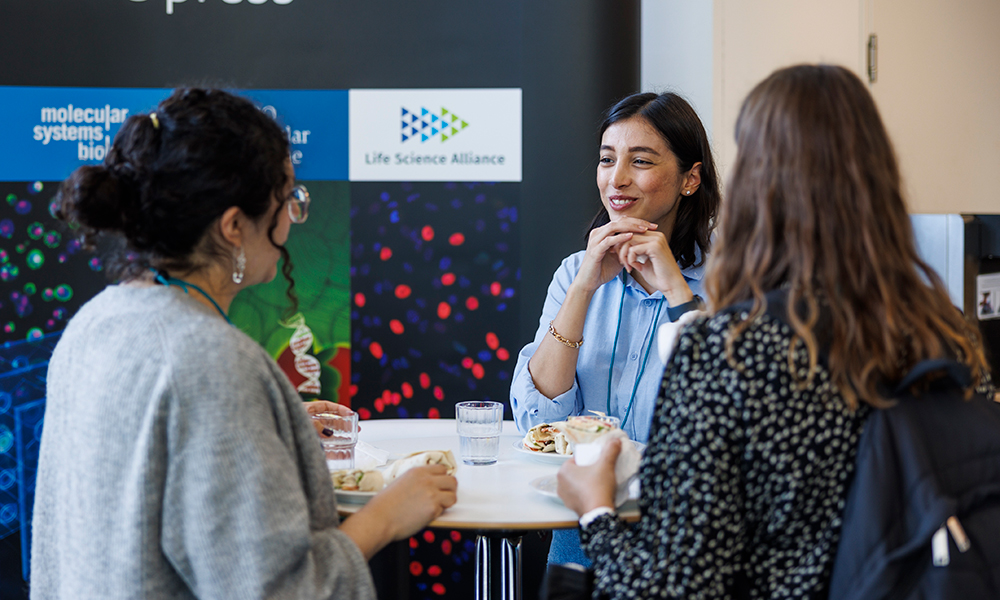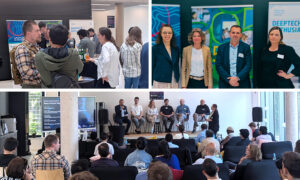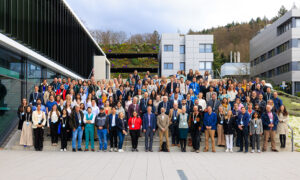
The EMBL Connection
EMBL's fourth Partnership Conference highlights the value of its scientific networks

EMBL’s Heidelberg site was buzzing with activity recently, as more than 300 participants attended EMBL’s fourth Partnership Conference. The auditorium and foyers of the Advanced Training Centre hummed with energy and discussion, as EMBL’s partner institutes came together to explore new collaborations and to foster new research connections.
The programme included a focus on three key areas – stem cells and development; genomics and disease; and neurobiology – all chosen to bring researchers together in a meaningful way. The event started with a welcome from EMBL Director General Edith Heard, and a keynote speech from Andres Metspalu, Head of the Estonian biobank. Participants were then able to choose from a diverse range of sessions across the three overarching themes, followed by flash talks, poster sessions, and networking opportunities.
The programme also included the Young Investigators Meeting, for PhD students and postdoctoral fellows from EMBL and partner institutes. The YIM ran for 1.5 days after the Conference, and gave a great opportunity for participants to exchange ideas with peers from a wide range of organisations, as well as helping to lay the foundations for long-lasting professional networks.
Speaking ahead of the event, Head of International Relations Plamena Markova explained that, “over the last few years EMBL’s partnerships have gone from strength to strength. This Conference represents a great opportunity to bring people together from right across our member states, to share ideas, forge new links, and ultimately enrich the research that is being undertaken.”
The Conference offered many valuable opportunities for EMBL and its partner institutes, as well as a fantastic chance to meet face-to-face after so long. As the partner institutes apply a stringent scientific turnover model, the conference was an opportunity for new groups and their leaders to meet and connect.
Here is just a small selection of of the views shared by those attending:
Fostering new ideas:
Virginijus Šikšnys, Science Director of Vilnius University Life Sciences Center – VU LSC – explained how the Center has benefitted from the dynamic spirit that he sees as a key characteristic of EMBL. A new partnership agreement between EMBL and VU LSC was signed in 2020, and senior EMBL leadership visited the Center’s inaugural event last year.
Looking at things from different angles:
Judith Zaugg, EMBL Group Leader, benefitted from being able to meet in person with researchers from other institutes who have close ties to her group. Being able to interact with a number of people from the Centre for Molecular Medicine Norway – NCMM – offered the chance to discuss new approaches to complex questions, and to experience different but complementary approaches.
A window into new methods:
Poul Nissen is Director of the Danish Research Institute of Translational Neuroscience -DANDRITE. DANDRITE is the Danish node of the Nordic EMBL Partnership for Molecular Medicine, which facilitates collaborative research, access to scientific infrastructure, and fosters outstanding international research talent. He felt the Partnership Conference offered a great chance to hear about new methods, particularly those relating to types of imaging that are applicable to neuroscience.
Cutting edge science to be inspired by:
Lionel Christiaen, Director of the Sars International Centre for Marine Molecular Biology in Bergen, felt inspired by the talks, and fortune to be able to follow up with those researchers giving them. The Sars Centre comprises various studies of the basic biological processes in marine biology, using functional and comparative molecular methods, and has been an EMBL partner since June 2003.
Breaking down knowledge silos:
András Dinnyés, from the Hungarian Centre of Excellence for Molecular Medicine – HCEMM – has deep experience in bringing together work across different fields, as well as bridging the gap between research and industry. He explained how the wide range of fields and techniques being discussed at the Conference helps to move research forwards.
Broadening scientific networks:
Maria Sachkova, a postdoctoral fellow at the Sars Centre, and Bernhard Payer, Group Leader at the Centre for Genomic Regulation in Barcelona, both gave talks at the conference. In their conversations during coffee breaks, they discovered they had common friends amongst their scientific networks. Both commented that the Partnership Conference allowed greater insight into other disciplines than specialised meetings that cover a smaller range of topics.
Deepening understanding through new tools:
Derrick Lau, a postdoctoral researcher from the University of New South Wales and EMBL Australia, came to give a talk on his work on Parkinson’s Disease and single molecule strategies. He felt the breadth of the talks provided a great opportunity to explore something beyond his discipline.
Related links
- The Molecular Medicine Partnership Unit
- Vilnius University Life Sciences Center (VU LSC)
- Danish Research Institute of Translational Neuroscience (DANDRITE)
- Sars International Centre for Marine Molecular Biology
- Hungarian Centre of Excellence for Molecular Medicine (HCEMM)
- Centre for Genomic Regulation (CRG)
- EMBL Australia


